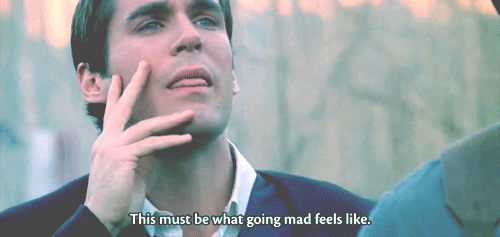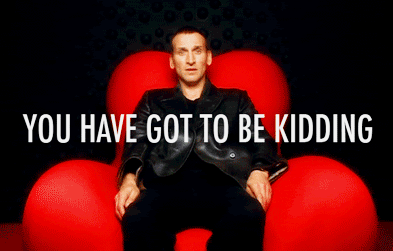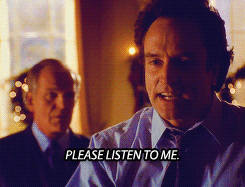There’s a radio at work. I have no control over it. I’m frequently subjected to music that I dislike and from time to time, if a song is popular, I become intimately acquainted with music that I loathe. Taylor Swift’s “Bad Blood” is an excellent example of the latter. Musically, it’s simply not my cup of tea. Lyrically, on the other hand, it makes me fly off on these angry rants that probably make my coworkers wonder if I’ve skipped any important medications lately.
I don’t know who wrote the lyrics. It could have been Ms. Swift herself, or maybe she had some help from her army of songwriters. Regardless, it’s nobody’s best work.
The song begins with the word because. Technically, I suppose it’s ’cause, but it still baffles me why this word choice is supposed to make any sense. It’s the first word of the song. Nothing has been said at all yet, much less anything that indicates a cause-and-effect relationship requiring an explanation. And it’s not as though this relationship is explained in the tail end of the sentence (“Because you betrayed me, we have bad blood.”) In fact, instead of the cause of the situation following the word because, the effect (having bad blood) follows our opening conjunction. This implies that the cause of the circumstance is whatever Taylor said before her microphone turned on and started recording in the middle of a sentence.
Even after that baffling opener, it’s all downhill from there.
The lyrics make a weird attempt at sounding hip, which is a feat achieved by ignoring most of the rules the average person is taught in a middle school English class. The first line (and many others) uses got instead of have, the second employs the slang definition of mad, and the third line…ooooh, that pesky third line makes my fists clench and my teeth grind:
So take a look what you’ve done
This little gem includes a prepositional phrase that is heroically devoid of prepositions. All this line needs is two little letters: an A and a T. Sure, saying “take a look at what you’ve done” would throw off the rhythm of the vocal delivery, but that just means you should tweak or rewrite the line, not just skip a word and assume it still works.
The pre-chorus similarly ignores acceptable conventions of communication, and I’m not saying that to applaud its bold, out-of-the-box artistry:
Oh, it’s so sad to think about the good times, you and I
The way I’m reading it, the words you and I have been pointlessly tacked on to the end of an otherwise acceptable declarative sentence in an effort to extend the melody and give it a chance to resolve itself. Or perhaps the comma isn’t supposed to be there and the chorus literally interrupts the pre-chorus without letting it finish its thought with a simple had or enjoyed or maybe even shared.
In a number of places throughout this messy composition, extraneous words have been thrown in to force the rhythm to be consistent. This is done frequently in music and, depending on the delivery, really isn’t a problem at all. But this song is one of the worst offenders I’ve seen in a while.
My personal favorite is “salt in the wound like you’re laughing right at me.” The word right is completely unnecessary to the meaning of the line and, in fact, makes it bizarrely specific. Apparently the lyricist felt compelled to indicate that not only is someone laughing at the narrator of this song, but that the laughter in question is arriving on a direct and undeviating vector from its source. Because we were all worried that maybe it had stopped to buy gas or something on its way to reach the ears of the narrator.

Also, the comparison between salt in a wound and mocking laughter should probably be explained more adequately for those of us who may not see any salient similarities.
The cliché blood/cut/knife/scar motif also seems clumsily executed. I’m a bit baffled about why a cut results in “bad” blood. Cuts can cause blood to flow, sure, by why is it bad blood in this case? The literal and the metaphorical sides of the symbolism don’t jive at all. It’s probably supposed to be simply a little bit of wordplay relating two concepts that both involve blood. If that’s where it had ended, it wouldn’t really bother me…but the bridge overreaches:
If you love like that, blood runs cold
Here is another concept involving blood, but this one has nothing to do with anything except that it continues the blood thing and it almost rhymes with a previous line. Blood running cold points to fear or horror. How, exactly, does loving in a way that is not clearly indicated by the text fill a person who is not clearly indicated by the text with dread? Even giving the benefit of the doubt by assuming Ms. Swift is trying to call someone cold-hearted, it still means the symbolism is all over the place. Is the blood bad or is it cold? Or is it salty? Just because all this imagery has to do with blood doesn’t mean it’s all thematically relevant.
The bridge contains two lines that I think actually have a nice ring to them. Band-aids don’t fix bullet holes is perhaps the most poignant part of the song. And If you live like that, you live with ghosts has a contemplative, regretful wisdom to it…except I’m not convinced it was written in for any other reason that to sound cool (and, of course, to almost rhyme with the preceding statements).
But then the song blasts back into the awful chorus a few more times for its grand finale, driving home the hopeless moral of the story, which is that “now we got problems” and “I don’t think we can solve them” and “now we got bad blood, hey!” If you were hoping for some kind of resolution or emotional payoff from this song, you will be left wanting. All Ms. Swift is saying, essentially, is that we have problems. There’s no attempt made at resolving them and there’s not even a suggestion of a termination of the relationship. It’s simply a pointless observation about the state of things. But rest assured, dear listener, if you’ve learned anything from this, it’s that now we got problems.
I’m not a Taylor Swift fan and I never have been, but this song just feels so beneath her. She’s better than this. I honestly miss the days when it was just a girl with her guitar, cranking out heartfelt (if somewhat hackneyed) melodies about fairy-tale romances. There was something so much more musically genuine and lyrically endearing about those tracks, and I’d gladly listen to “Teardops on My Guitar” or “Love Story” a thousand times if it meant I would never again be subjected to “Blank Space” or “Bad Blood.”

